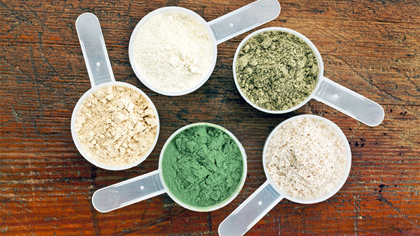by Nancy Weyrauch Mehlert, MS
One of the most frequent questions I get as the staff nutritionist is about protein powders and green superfood powders. For many people, these popular powders represent a healthy, simple, and quick way to get nourishment. But are they safe and healthy?
Pause for just a moment and consider these powders. Do you really know what is in that canister? Does it resemble anything like the original plants or animals from which it was derived? How did it become a powder? What processes and techniques were used to extract the nutrients from the original source? Could it be something other than what the package claims to be? Could harmful things make their way into the product? Did the manufacturer test or confirm the purity of its product?
I would argue that most food powders contain things that would surprise you, and perhaps much more than the ingredient list implies or the manufacturer claims. The Clean Label Project [https://cleanlabelproject.org/the-best-worst-protein-powder-products/] has carefully tested 134 of the most popular protein powders in the marketplace and discovered a plethora of pesticide, heavy metals, and plastic residues in the vast majority of them. Recently, I picked up a container of Psyllium Husks that were described on the packaging as “100% Pure Psyllium, No Additives, No Fillers, Non-GMO, and Gluten Free” but on the back of the package in small print a warning was written, “This product contains a chemical known to the State of California to cause birth defects or other reproductive harm.” Last year, I contacted a maker of a protein powder who claimed their product was pure, organic, and Non-GMO. I inquired if they had conducted an analysis of their product for plastics, pesticides, or heavy metals. The representative responded proudly with a “yes”! When I asked if I could see the Certificate of Analysis, she claimed that this information was not available for the public. When I hung up the phone, all I could think of was that, if their product were clean and free of any concerns, then they would have had nothing to hide. It caused me to pause and consider the high likelihood that powdered products, from green drinks to protein powders are not as good for us as we might believe. Some of the most well marketed, popular, organic brands are very likely to contain heavy metals and plastics.
Please consider that powders are highly manufactured, processed products, far from the original source. In many cases, it may be generous to even call them “food”. Though organic certifications should protect the original source to be free of pesticides, herbicides, fungicides, and not genetically modified, it does not mean there are not plastic particulates or heavy metals in that powder. It does not ensure that chlorine or other bleaches and chemicals have not been used to make the final product. We should shop carefully, ask questions, and tend toward consuming real whole food.
If a protein powder is helpful to you, we have vetted some pharmaceutical grade protein powders that have been tested for purity which we can safely recommend.


